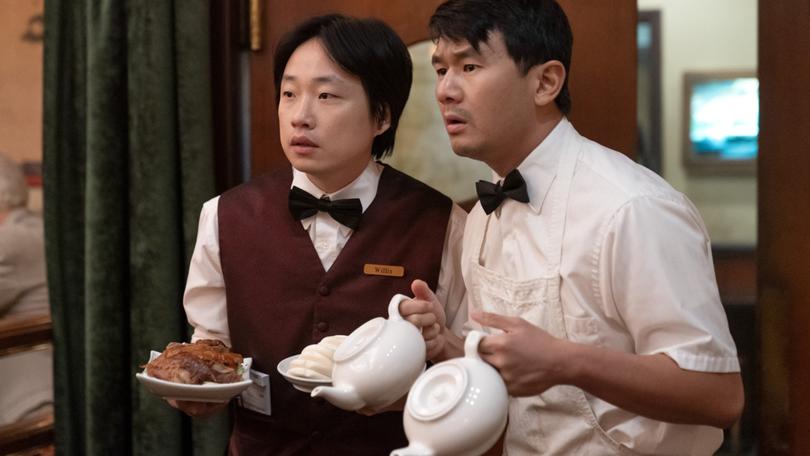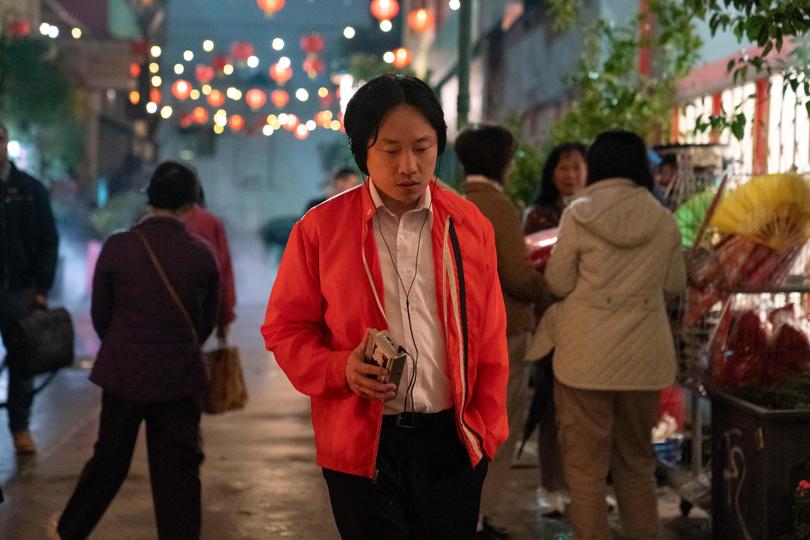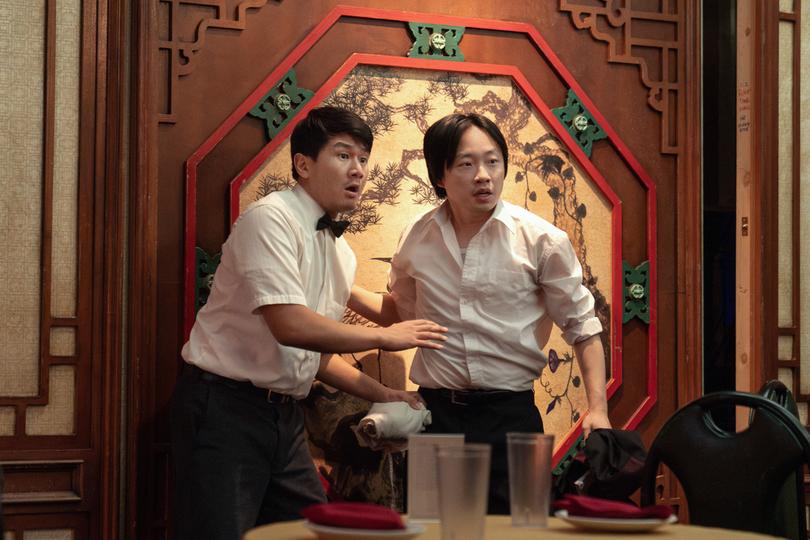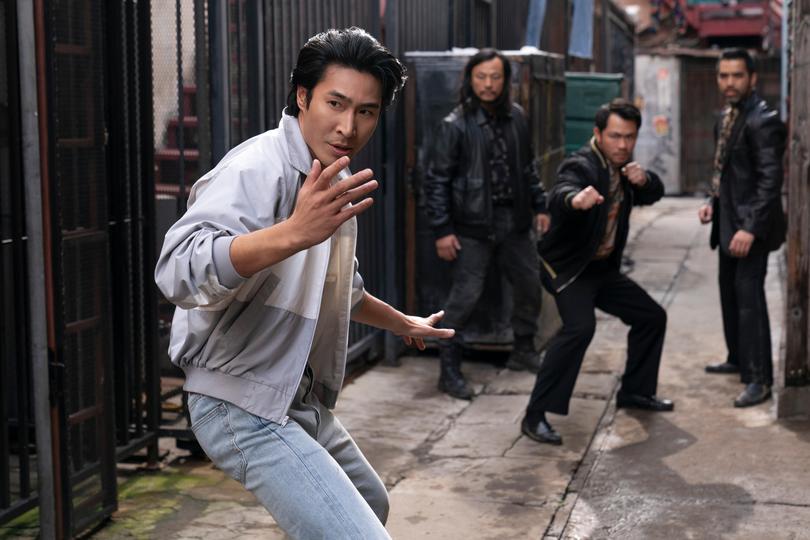Interior Chinatown is out to bust stereotypes, and funnyman Jimmy O Yang is the one to bust them

When you’re an actor of Asian heritage in Hollywood, you’re familiar with all the stereotypes. One of the most pervasive ones is Kung Fu Guy.
This is a character who is not named, has no backstory or motivation and rarely has lines apart from a “hiiiiyah” screamed as they launch with a high kick. The only thing you know about them is they’re good at kung fu because … they’re Asian.
It’s one of the cliches that gets busted in Interior Chinatown, a strange and very meta series that experiments with form, based on Charles Yu’s acclaimed novel.
Sign up to The Nightly's newsletters.
Get the first look at the digital newspaper, curated daily stories and breaking headlines delivered to your inbox.
By continuing you agree to our Terms and Privacy Policy.The name refers to a scene direction in a screenplay, meaning that it is set inside in Chinatown, but it could easily mean that it wants to burrow into a world that is often used as a backdrop, a world that is all surface and no interiority.
The unconventional story is centred on Willis Wu, played by Jimmy O. Yang, an actor best known for his scene-stealing role as Jian Yang in Silicon Valley. Willis is a waiter at his uncle’s Chinatown restaurant and, at one point, he gets into a round of fisticuffs during which he whips out some kung fu moves.
“The expectation is for you to kick serious arse but Willis is not that good,” Yang told The Nightly. “He starts off maybe a little good and then he gets his arse kicked. Within the physicality of that really fun action scene, it tells a story and busts that stereotype.”

Interior Chinatown, adapted for TV by Yu and with Taika Waititi directing the first episode, cleverly plays with the expectations of formulaic archetypes on screen. Its episode titles include Generic Asian Man, Delivery Guy, Tech Guy, Bad Guy and Translator. And, of course, Kung Fu Guy.
At its core is the contention that, too often, Asian characters in western screen projects don’t get to be a fully rounded person. They’re extras.
Willis, as far as he’s concerned, is only a background character in his own story. He’s desperate to break out of a loop, and becomes drawn into a crime procedural akin to Law & Order when he witnesses a kidnapping which drudges up old family secrets related to his brother’s disappearance.
“I was completely captured by (the story) and related to so many different parts of it, being Asian-American, often feeling like maybe I was invisible,” Yang said. “Of course, my own acting journey in the industry (reflects this), going from being a background actor to the tech guy to now. I was like, ‘Wow, this is unbelievable’.
“Charles was able to really convey the story of how a lot of Asians feel that I haven’t been able to put into words.”
That feeling of not being seen is behind one of the show’s funniest sequences. In the second episode, Willis tries, in vain to enter the police station but is foiled. Not only can he not get through the door, he is also, seemingly, literally invisible to two police officers discussing the case outside the building.
The sequences use Buster Keaton-esque physical comedy to make the point and elicit some solid laughs. That’s the line the series is trying to walk – be funny, entertaining and weird, but also have something meaningful to say.

When Yang joined Silicon Valley as a guest star in its first season as the dry-as-chalk Jian Yang, he was paid the union minimum of $900 per episode. He made such an impression, he was promoted to a regular from season two onwards.
One of his early roles was “Chinese Teenager #1” in a 2013 episode of Marvel action series Agents of SHIELD, which starred Chloe Bennet, who is playing a junior detective in Interior Chinatown.
Interior Chinatown also reunites him with his Crazy Rich Asians castmates, Ronny Chieng and Chris Pang, who play his cousin and brother respectively.
There’s a strong Australian contingent (Chieng is technically Malaysian but given he went to university in Melbourne and got his start here, we claim him), which also includes Diana Lin, who plays Willis’ mum. Maybe Willis is secretly Australian?
“It was such a joy to work with Ronny on every scene. We have a shorthand with each other, we’re good buds so we’ll talk it through, and there’s so much energy to it.
“Chris has always been an older brother to me, we hung out a lot, we play video games together. So, it was nice to have that reunion and have that chemistry already built-in.”

Yang never expected he would get to be the lead in his own project.
“I didn’t even know the background role was going to come,” he said. “I felt like I had to manoeuvre my way or really fight for it, but it wasn’t about ‘One day I’m going to be a leading man’.
“It’s more about ‘Take it step by step, moment by moment’. OK, how do I get this background role? Do I need a better headshot? How can I get this two-lines part? Do I need more training?
“As long as there was progress, if I did one line this year, I’m going to do three lines next year. As long as there was progress, however minute it was, I was like, OK, I’m going in the right direction. So, it’s such a blessing now to be playing Willis.
“Sure, I’m the leading person in the show, but all my experiences of playing background actors, the tech guy, the generic Asian man, Chinese teenager No.1 , really helps inform what Willis is going through.”
Now that Yang has the leading role in the bag, what does next year look like? How do you step up?
“I don’t know, I could go play a superhero or be in some interesting films, but, at this point, I think progress doesn’t just mean work. It could be life progress, it could just be being a nicer son or being a better person.”
Interior Chinatown is streaming on Disney+

